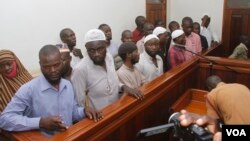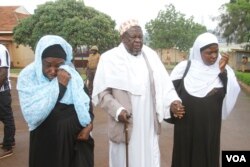Police in Uganda have come under fire for allegedly torturing suspects, with both the president and interior minister publicly recognizing the problem this week and calling for it to end.
On March 17, Uganda's assistant inspector general of police was gunned down in Kampala. Five days later, police said they were holding 17 suspects; however, it was a month before those individuals appeared in court. While media was blocked from the proceedings, leaked photos of the inmates appeared to show clear signs of abuse.
When the suspects were brought to court for a second time on May 5, the detainees told the magistrate they were being beaten. They raised their hands several times, showing the magistrate wounds and bruises on their wrists. They said they were being kept handcuffed for long periods of time and were not being fed.
The proceedings were broadcast on national television, sparking outrage.
Ugandan police spokesperson Asan Kasingye says two police officers have been arrested.
"[In] the techniques of investigations, torture is not cited anywhere," Kasingye said. "So if you step out of procedure, definitely we shall question you, not only why you did it but you must also tell us, who told you to do it, if you were under command."
The 17 suspects looked to be in better shape Thursday at their third court appearance. Witnesses say a few of the suspects appeared to be limping, and several had what looked to be healing wounds on their arms.
President on torture
Earlier this week, President Yoweri Museveni released a public letter to security chiefs. The president said torture is "unnecessary and wrong" and does not produce reliable evidence. He said torture is not to be used.
The Minister of Interior Affairs then appeared before parliament and apologized to the country in response to the media reports of police torture. He admitted that laws have been broken and said investigations are ongoing.
However, Uganda Law Society President Francis Gimara says it will take more than words to create lasting change. He says the law society is engaging with the Director of Public Prosecution.
"We want him to enter into an MOU [memorandum of understanding]," Gimara said. "We say for torture cases, give them to us, Uganda Law Society. We will prosecute the commanding officers because we think they are the ones responsible for these increased acts of torture and torture is unacceptable because it is degrading, it is traumatizing, and in this time and age, barbaric."
New police procedures
Police spokesperson Kasingye says police are implementing new procedures to document a detainee's condition at the time of arrest.
"Before you sign [a] detention order form, [you] ascertain the condition under which that suspect has been brought," Kasingye said. "And if you are not sure about the medical condition of that suspect, you are not obliged to detain that person. And number two, to make sure that somebody is treated."
Uganda's anti-torture act of 2012 prohibits intentionally causing pain to anyone to obtain information or a confession. Conviction of violating that law could result in imprisonment for 15 years.
Proof of torture has undermined prosecutions in Uganda. At least two cases have been dropped in recent years after defense lawyers presented evidence that their clients had been tortured while in custody.
The 17 suspects detained in connection with the murder of the police commander are expected back in court on June 1.







